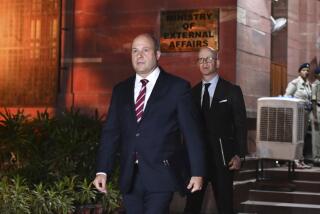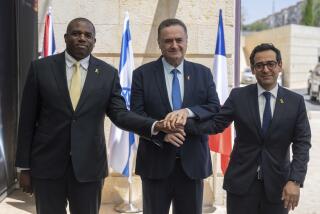12 European Nations Will Clamp Down on Iraqi Diplomats : Sanctions: Some will be expelled, others confined. Ministers fail to agree on aid for Turkey, Jordan, Egypt.
- Share via
BRUSSELS — The foreign ministers of the 12 nations of the European Community agreed Monday to expel military personnel from the Iraqi embassies in their capitals and to limit the freedom of other Iraqi diplomats to travel within their borders.
But the foreign ministers, in their second such joint effort, again fell short of consensus on financial aid to Turkey, Jordan and Egypt, which have lost substantial export markets because of the U.N. economic embargo against Iraq and Kuwait.
In a statement citing last week’s Iraqi incursions against the French, Belgian and Dutch embassies in Kuwait, the ministers said they “have decided jointly to expel military personnel based in Iraqi embassies and to limit the freedom of movement of personnel in those embassies.”
In addition to the three European diplomatic compounds, Iraqi troops also raided the Canadian Embassy in Kuwait last week.
Even before the joint announcement, Britain expelled six Iraqi Embassy staff members in London and ordered 23 more Iraqi nationals in Britain to return home, while Belgium restricted the movement of Iraqi diplomats to a small area around Brussels. Italy had announced similar action Sunday.
British Foreign Secretary Douglas Hurd said his government was expelling the Iraqis, among them two defense attaches and four staff members in the embassy’s military section, as an expression of solidarity with European allies.
Iraq invaded Kuwait on Aug. 2 and has ordered all foreign diplomats out of Kuwait on grounds that it is no longer an independent country. Iraqi troops ring the many embassies where diplomats have refused to leave.
The European foreign ministers also considered but postponed action on a proposal by Jacques Delors, the president of the European Community, that the EC dedicate about $2 billion to assisting Turkey, Jordan and Egypt. Half the money would come from the EC budget and half from the 12 member nations.
Britain’s Hurd argued that any such aid formula should take into account the substantial contributions that some European nations, including Britain, have already made to the U.S.-led multinational force in the Persian Gulf area to prevent further Iraqi aggression, particularly against Saudi Arabia.
Just 10 days earlier, the European foreign ministers, meeting in Rome, had agreed in principle on an aid package to Turkey, Jordan and Egypt, although they did not set an amount. The finance ministers of the 12 nations, meeting the next day, cautioned that any aid should be approved only after a thorough study of the recipients’ needs and the donors’ abilities to pay.
The United States, which dominates the multinational military force arrayed in the gulf after Iraq’s invasion of Kuwait, had asked the European nations to help defray the cost of the buildup, or, short of that, to help the nations suffering from the U.N. trade embargo against Iraq and Kuwait.
Despite the reluctance of the 12 nations to act jointly, at least seven of them have contributed in one way or another to the multinational military presence in the gulf.
West Germany, which has constitutional restrictions on what it can do militarily, has contributed minesweepers and vehicles capable of detecting and analyzing the presence of poison gases. Iraq has chemical weapons and, according to the U.S. mission to the European Community, West Germany is ahead of the United States in the development of chemical weapons survey vehicles.
Also, West German Chancellor Helmut Kohl on Saturday pledged $2 billion, about half to defray the costs of the military buildup in the gulf and half to assist Turkey, Jordan and Egypt.
France, provoked by the Iraqi raid on its embassy in Kuwait, announced Saturday that it would send 4,000 ground troops to Saudi Arabia as well as aircraft and tanks, to bolster the three warships it had already dispatched.
Britain has sent 6,000 troops and seven warships, as well as fighter aircraft. Italy has dispatched five warships.
Among the other EC nations, Denmark, the Netherlands and Spain have made smaller contributions to the force in the gulf region. Beyond that, according to a U.S. survey, Greece has offered three vessels for sea-lift purposes, and Portugal has turned away an Iraqi merchant vessel that had been scheduled for repairs at a Portuguese shipyard.
Hurd told reporters that Britain ordered the Iraqi expulsions because of a conviction “that we’ve got to act in solidarity with the French and the other countries whose embassies have been invaded and people taken out during the last few days.”
Home Secretary David Waddington, who announced the details of the expulsion in London, said that he considered their presence “not to be conducive to the public good for reasons of national security.” He provided no names of the civilians involved, but most are believed to include students and, possibly, business people.
Iraq’s ambassador to Britain said the expulsions are unfair.
Staff writer Mark Fineman, in London, contributed to this article.
More to Read
Sign up for Essential California
The most important California stories and recommendations in your inbox every morning.
You may occasionally receive promotional content from the Los Angeles Times.













